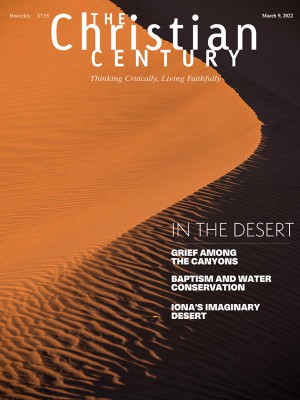Why go to church camp?
Jacob Sorenson has written a wise, informative, and practical study of the benefits of Christian summer camps.
My former professor Don Browning defined practical theology as “critical reflection on the church’s dialogue with Christian sources and other communities of experience and interpretation with the aim of guiding its action toward social and individual transformation.” Sacred Playgrounds is a practical theology project that Browning would have admired. Jacob Sorenson seamlessly weaves together theology, church history, scripture, and empirical research about the impacts of Christian summer camp on campers.
The book contains two complementary arguments: the Christian summer camp experience makes multiple measurable impacts on campers, and camping ministry deserves attention from academic scholars. The research supporting the project is impressive. During the summers of 2015 through 2019, Sorenson’s team surveyed more than 7,000 campers at over 35 Christian camps across the United States and Canada.
Read our latest issue or browse back issues.
The studies revealed that camp experiences have statistically significant impacts on multiple measurements of faith formation. The outcomes are much more than a simple “camp high,” which fades. Sorenson measured significant outcomes that are maintained at least three months after campers return home. Furthermore, there is additional empirical evidence that religious camp experiences show significant positive impacts on participants at least five years later, especially related to communal religious practices and identification with faith communities.
The book begins with an introduction to what camp is and why Sorenson’s project is unique. He lays out why play matters and why he chose the metaphor of the playground: “Our invitation today is not to climb onto a particular apparatus but rather to find a space where we can play together. At the heart of our longing for a playground is the deep-seated desire to be in relationship.”
Sorenson provides a rich history of Christian camping ministry in the United States. This section of the book will be interesting for any church historian, whether academic or armchair. It also will help general readers understand a great deal about camping ministry today. Sorenson also examines the history of scholarship on camping ministry, noting its failure to take a deeply empirical approach. “Consequences for a reliance on anecdotal evidence are clear: camp itself is devalued and considered dispensable,” he writes. Sorenson is providing an alternative, a project built on all the empirical evidence he has collected yet also full of engaging stories. These stories propelled me through the book. Many come from his own years as a camper, counselor, and director. Others come from his work as a researcher, interviewing campers and staff around the country.
Sorenson writes about both the Confirmation Project, which included camping ministry as a major component, and the American Camp Association’s more recent emphasis on outcomes-based research and scholarship. Sacred Playgrounds would have been possible without these two projects, but they certainly gave Sorenson (who did the camp research for the Confirmation Project) great training and tools. They also allowed him to be part of a larger movement of current research and reflection on the impact of camp.
The second section of the book is devoted to the five fundamental characteristics of Christian summer camp that Sorenson’s research uncovered. Each chapter’s subtitle reveals its focus: “Camp Is Unplugged from Home,” “Camp Is Participatory,” “Camp Is Church, Too,” “Camp Is Relational,” and “Camp Is a Safe Space.”
Sorenson explains early on that the book is an exercise in practical theology and is intended to be interdisciplinary. In these chapters on the five fundamentals, his practical theology shines. While the piles of surveys and thousands of data points garner my respect for the project, the vivid storytelling and quotes are what I love. We hear from one young camper on the impact of camp: “Once you actually get away from your life, you can see a whole different angle, and it can be a lot more fun and exciting.” Another camper writes: “Being gone from technology kind of clears your brain.”
Sorenson’s practical theology exercise shines brightest in the chapter “The Face of the Other: Camp Is Relational.” He weaves interviews with campers from a variety of camps with a discussion on the differences between centralized and decentralized camping, which includes statistics and arguments about how and why relational breakdowns do happen at camp. He writes about the power of small groups and relational encounters, drawing on quotes from theologians living and dead, scripture, neurobiology, psychology, the history of trauma, and the American Camp Association’s Directions study.
I was a camper and counselor at Christian camps and am now what’s sometimes called a raving camp fan. But I do not think you have to be any of those things to glean some wisdom for ministry from Sacred Playgrounds. Anyone trying to love as Jesus loved can gain new perspectives from these pages on caring for young people.
Camp professionals and boards will receive from this book a mandate to be their authentic Christian camping ministry selves. Public ministers serving any kind of Christian community will benefit from discussing the chapters on the five fundamentals, each of which connects its camp characteristic with congregational life. The connections could easily be applied to a campus ministry, a judicatory, or even a hospital chaplaincy program. Sorenson makes these connections with the hope that camps and other Christian communities will remain yoked. He simultaneously recognizes that, for some campers, “camp is their primary space of religious connection and belonging.”
I hope Sacred Playgrounds will be discussed around the campfire, in ministerial groups, and in seminary and divinity school classrooms. We need camping more than ever. Sorenson has given us the research and stories to explain why that is so—and the knowledge to engage in Christian camping ministry effectively in the years to come.







